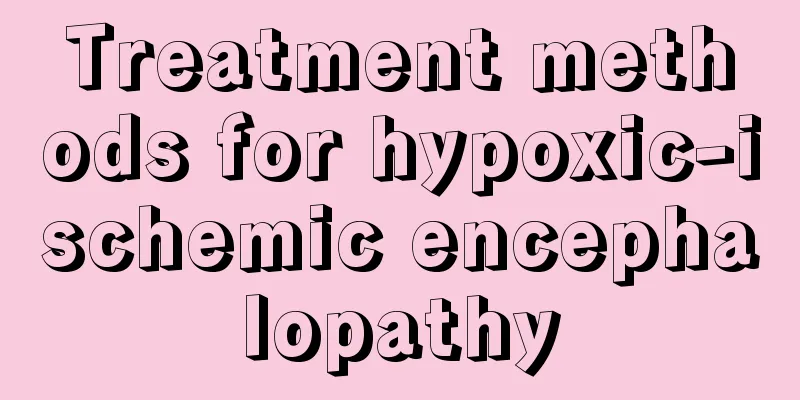Treatment methods for hypoxic-ischemic encephalopathy

|
The treatment of hypoxic-ischemic encephalopathy should focus on prevention, especially if the fetus is in distress in the womb. Pregnant women should pay attention to timely oxygen supply. After birth, infants should be allowed to lie flat, with less disturbance and keep breathing smooth. 1. Oxygen supply: Choose various oxygen supply methods according to the patient's condition, keep blood oxygen PaO2 above 6.6-5.9.31 kPa (50-70 mmHg), and PaCO2 below 5.32 kPa (40 mmHg), but be sure to prevent PaCO2 from being too low to avoid reduced cerebral blood flow. 2. Maintain normal blood pressure and avoid excessive fluctuations in blood pressure to maintain stable cerebral blood perfusion. When blood pressure is low, dopamine (continuous intravenous drip of 3 to 10 μg/kg/min) and dobutamine (continuous intravenous drip of 3 to 10 μg/kg/min) can be used, and blood pressure can be monitored. 3. Correct metabolic disorders. Mild acidosis and respiratory acidosis can be corrected after improving ventilation. Sodium bicarbonate is only used in moderate to severe metabolic acidosis. The dosage should not be too large to maintain blood pH at 7.3-7.4. In case of hypotension, intravenous drip of 10% glucose was used, with the first dose being 2 ml/kg and the subsequent doses being 5 ml/kg?h, to maintain blood sugar at 2.80-5.04 mmol/L (50-90 ml/dl). Since endorphins increase after asphyxia, some people have tried using naloxone (naloxone) intravenous drip 5-10μg/kg?h, up to a total amount of 0.1mg/kg?d, to antagonize endorphins. 4. To control convulsions, a loading dose of 15-20 mg/kg of phenobarbital can be used by intravenous drip, and a maintenance dose of 3-5 mg/kg/d can be used after 12 hours. 5. Control cerebral edema and limit fluid intake to 60-80 ml/kg/d. Mannitol can be used as a dehydrating agent, 0.5-0.75/kg each time, once every 4-6 hours, but the dehydrating agent should not be overdosed. Although dehydrating agents can reduce cerebral edema, they cannot reduce brain damage. |
<<: Can asthenia be cured quickly?
>>: What foods can improve the three highs?
Recommend
What happens if people sleep too much
Sleep is an activity that everyone must perform e...
Two types of urinary diversion after total cystectomy
Total cystectomy for bladder cancer involves a wi...
What are the symptoms of polymyositis
Polymyositis is an autoimmune disease. Because po...
Be careful if you have these symptoms as they are signs of stomach cancer
Gastric cancer is one of the more common cancers....
What is the reason for acne at the junction of cheek and neck
Many people will get acne. Acne can occur due to ...
What to do if cystitis and bleeding occur during radiotherapy for cervical cancer
It is a common clinical phenomenon that cervical ...
How to eat dark chocolate to lose weight
Dark chocolate is a relatively pure type of choco...
How to judge whether furniture contains formaldehyde
As we all know, formaldehyde is extremely harmful...
What is the most effective way to prevent lung cancer? Eight actions to prevent lung cancer
According to the test results released by the Dis...
Optic atrophy
Many people don’t know much about optic atrophy. ...
Is chronic thyroiditis serious? It turns out to be like this
Chronic thyroiditis is a relatively common diseas...
Experts introduce the TCM treatment methods for pancreatic tumors
Pancreatic tumors are divided into benign and mal...
What are the dangers of ascites in late stage liver cancer
Liver cancer is a tumor that is very harmful to t...
How to reduce fever without medicine
Although fever is very common, it still has a gre...
What are the early treatments for uterine tumors?
Traditional Chinese medicine is a traditional Chi...









